The Devil of Deauville
Ralitsa Kovacheva, October 19, 2010
 Under the famous phrase, according to which the Devil is in the details, this time he appeared in Deauville. There, in a strange format, the leaders of France and Germany gathered in anticipation of the Russian President. And even more strange is, that the meeting produced a common Franco-German declaration, dedicated to the economic governance of the EU. The document literally coincided in time with the remarks of the President of the European Council, Herman van Rompuy. He announced that the Task Force, led by him, has completed its report on the same topic and is ready to present it to the Council next week. The report itself is not public and everyone who is aware of it kept running away like a Devil from incense (to keep the style) from the questions of journalists.
Under the famous phrase, according to which the Devil is in the details, this time he appeared in Deauville. There, in a strange format, the leaders of France and Germany gathered in anticipation of the Russian President. And even more strange is, that the meeting produced a common Franco-German declaration, dedicated to the economic governance of the EU. The document literally coincided in time with the remarks of the President of the European Council, Herman van Rompuy. He announced that the Task Force, led by him, has completed its report on the same topic and is ready to present it to the Council next week. The report itself is not public and everyone who is aware of it kept running away like a Devil from incense (to keep the style) from the questions of journalists.
The Franco-German declaration, however, clearly shows what we are not told by Van 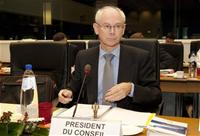 Rompuy at this point. Generally, the decisions of the Task Force confirm previously known positions, detailed in the Commission's proposal of last month. First, greater fiscal discipline and broader economic surveillance with earlier and more severe sanctions for countries violating the Stability and Growth Pact.
Rompuy at this point. Generally, the decisions of the Task Force confirm previously known positions, detailed in the Commission's proposal of last month. First, greater fiscal discipline and broader economic surveillance with earlier and more severe sanctions for countries violating the Stability and Growth Pact.
Sanctions - who decides?
The Commission's proposal provides for financial sanctions to be imposed on eurozone members in the form of interest-bearing deposit, which in the absence of appropriate corrective measures will turn into a non-interest-bearing deposit and ultimately - in a fine. Moreover, the sanctions will enter into force automatically unless explicitly rejected by the Council by qualified majority - the so-called "reverse voting mechanism".
The rule, which is being applied for the first time, gives substantial powers to the European Commission and significantly reduces the influence of the Council, where Member States are represented. As Commission President Jose Manuel Barroso explained, "In the past, when the Commission's advice was harsh, it was not sufficiently followed by the Council. The changes I have outlined will avoid this from happening again."
 According to Van Rompuy's remarks, the Task Force has agreed on "more automaticity in the decision making" through the reverse voting mechanism. According to the Franco-German declaration, however, things do not look the same. It is explicitly stated that, yes, sanctions "should be more automatic, while respecting the role of the different institutions and the institutional balance."
According to Van Rompuy's remarks, the Task Force has agreed on "more automaticity in the decision making" through the reverse voting mechanism. According to the Franco-German declaration, however, things do not look the same. It is explicitly stated that, yes, sanctions "should be more automatic, while respecting the role of the different institutions and the institutional balance."
If you are still wondering what this means, there it is in the plain text: "The Council should be empowered to decide, acting by QMV [qualified majority voting] to impose progressively sanctions in the form of interest-bearing deposits on any Member State whose fiscal consolidation path deviates particularly significantly from the adjustment path foreseen in the Stability and Growth Pact.” The penalties become automatically triggered only when the Council has concluded that the Member State concerned has failed "to implement the necessary corrective measures within a 6-months time limit". This means the decision on sanctions will be taken by the Council, which in practice repeals the reverse voting mechanism and the eventual greater power of the Commission.
The question is why Germany, which insisted the most on earlier, more stringent and more automatic sanctions, is stepping back from its position? The answer, obviously, is: because France was against.
What is the deal?
Many believe this was the price of France's to support for Germany's insistence a 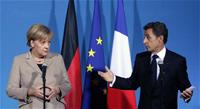 permanent crisis mechanism to be urgently elaborated. It is intended to replace the temporary (because of the Greece) rescue fund for the euro area (The European Financial Stability Facility (EFSF). This permanent mechanism has to ensure "the necessary arrangements for an adequate participation of private creditors and allowing Member States to take appropriate coordinated measures to safeguard financial stability of the Euro area as a whole."
permanent crisis mechanism to be urgently elaborated. It is intended to replace the temporary (because of the Greece) rescue fund for the euro area (The European Financial Stability Facility (EFSF). This permanent mechanism has to ensure "the necessary arrangements for an adequate participation of private creditors and allowing Member States to take appropriate coordinated measures to safeguard financial stability of the Euro area as a whole."
Moreover, both countries insist “in case of a serious violation of basic principles of the Economic and Monetary Union” the Member State concerned to be punished with a suspension of voting rights.
For this to happen, however, changes are needed in EU Treaties, because currently they prohibit bailing-out euro area countries and do not provide political sanctions. France and Germany have already proposed a way to circumvent the changes related to the suspension of voting rights through a political agreement among eurozone countries. In the long run, however, linking political sanctions to the permanent crisis resolution mechanism is the best way these to be accepted and noted in the Treaty.
Moreover, the lessons of the Greek crisis are still fresh and now is the proper time for difficult decisions, which perhaps would not be possible in a year. This is why France and Germany insist the President of the European Council to be asked to present concrete options on the matter before the EU summit in March 2011. And the corresponding amendment to the Treaties to be adopted and ratified by Member States in due time before 2013, when the EFSF expires.
It appears that Van Rompuy is aware of his future task and that the Task Force will obviously continue its work on the issue, because in his remarks he states:
"The Task Force considers there is a need for a credible crisis resolution framework for the euro area in the medium term. It should be capable of addressing financial distress and preventing contagion from one country to another. It must avoid the moral hazard implicit in any ex-ante rescue scheme. The precise features and operational means of such a crisis mechanism will require further work. "
The Task Force makes another interesting proposal that appears for the first time officially: “At the national level, the Task Force recommends the use or setting up of public institutions or bodies to provide independent analysis and forecasts on domestic fiscal policy matters".
Perhaps, this is in response to suspicions that the European Commission will hardly succeed in dealing with the detailed examination of the budgets of all 27 countries under the European semester. In order the Semester not to turn it into a formal exercise, it is better if the Commission can rely on independent institutions in the Member States, who are more aware of national circumstances. Whether they can remain independent from governments is a different question and is a subject of a separate analysis, if the proposal is to adopted at all.
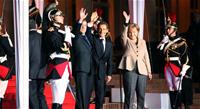 This will become clear at the end of next week, when the leaders of the 27 EU countries gather in Brussels for the last time this year for their decisive European Council. euinside will also be there. The leaders will discuss the Task Force report and obviously - the Franco-German proposals. And most likely, they will accept these, because the Semester is due to start in the beginning of 2011 and the other proposals have yet to be approved by the European Parliament and finally by the Council.
This will become clear at the end of next week, when the leaders of the 27 EU countries gather in Brussels for the last time this year for their decisive European Council. euinside will also be there. The leaders will discuss the Task Force report and obviously - the Franco-German proposals. And most likely, they will accept these, because the Semester is due to start in the beginning of 2011 and the other proposals have yet to be approved by the European Parliament and finally by the Council.
At this stage it is unclear whether there will be financial sanctions for the entire EU at all, as the Commission promised - because of the opposition of some Member States and because of the focusing on the urgent problems of the eurozone. This, however, should not relieve any country, nor allow it to read the European decisions as the Devil reads the Gospel. Because ultimately, Brussels is not a superintendent of tricky governments, which only seek not to be penalized. The purpose of sound economic policies, in the end of the day, is the welfare of their own countries – for which governments are accountable to their voters.
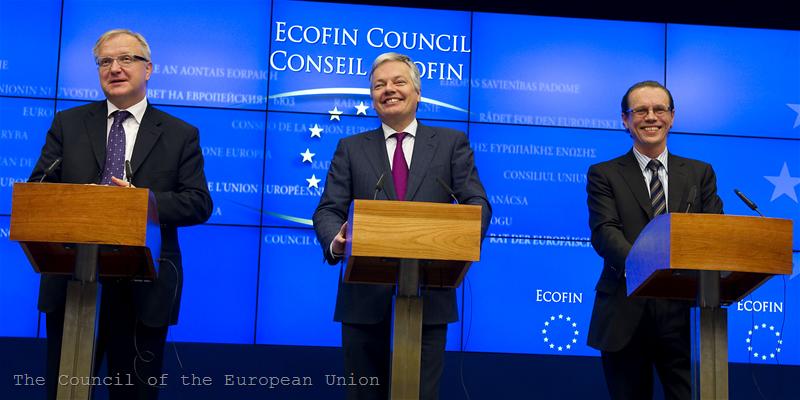 | © The Council of the European Union
| © The Council of the European Union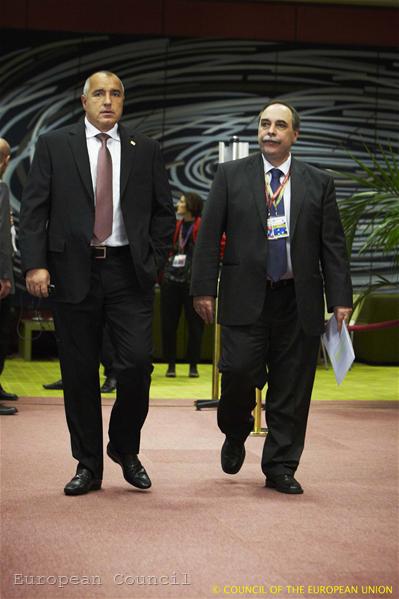 | © European Council
| © European Council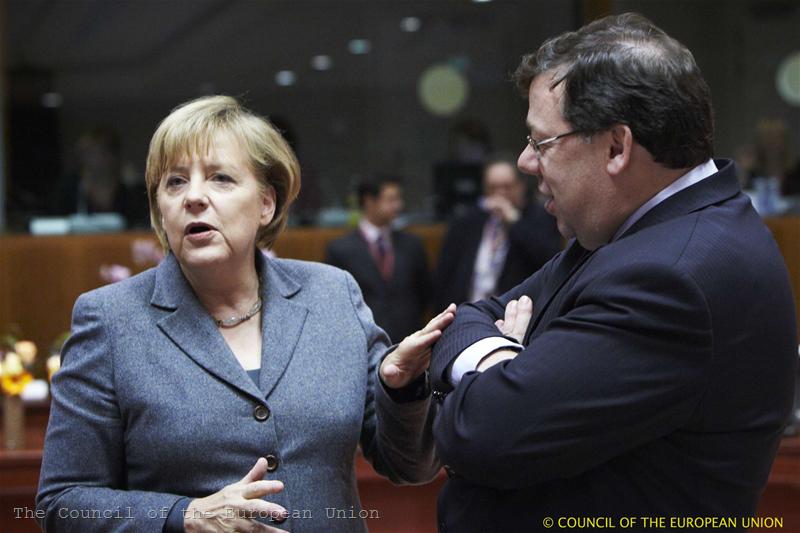 | © The Council of the European Union
| © The Council of the European Union